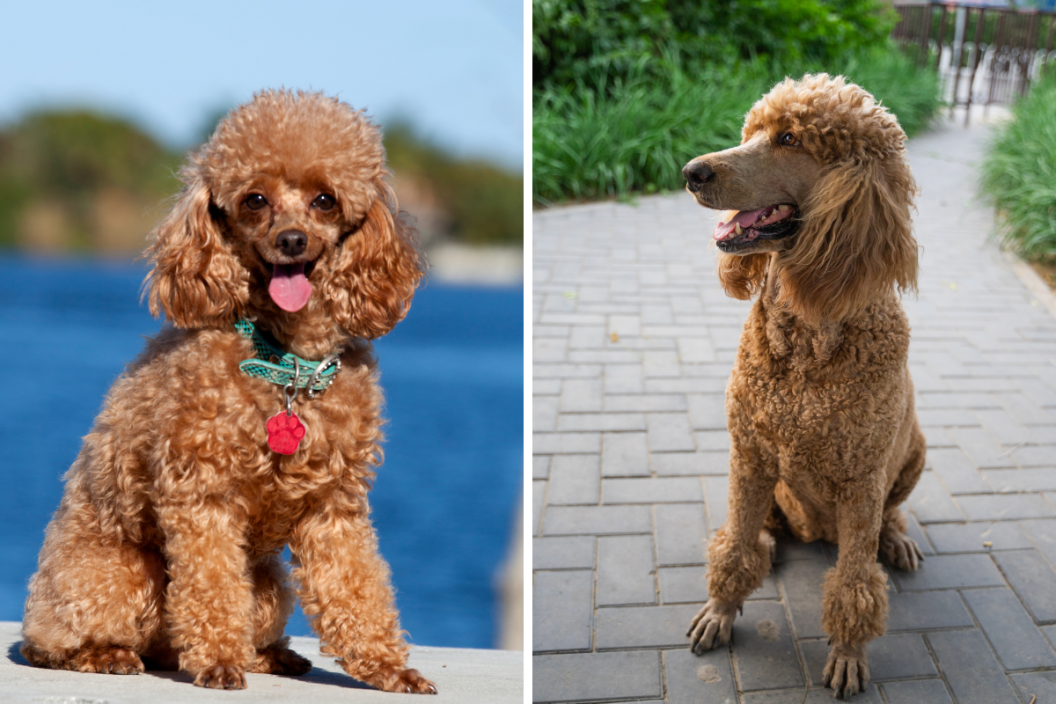The poodle is an iconic, beloved dog breed. Their hypoallergenic coats, affectionate personalities, and show-style hairdos set them apart from other dogs and, for some people, make them the breed of choice. Although the poodle has become a popular half of many mixed breeds like the labradoodle and the goldendoodle, there are also other types of poodles. In fact, the American Kennel Club and British Kennel Club recognize three sizes of the breed: standard, miniature, and toy poodles. Although the differences between a standard and the others may seem obvious, one may wonder about the toy poodle vs. miniature poodle.
Here's a deeper look at the differences between these tiny poodles.
Origins of the Poodle

Despite being the national dog of France, the standard poodle hails from Germany, according to the American Kennel Club. The breed's protective coat, swimming skills, and intelligence made it an ideal hunting companion, specifically for ducks. Over time, smaller versions of the poodle were bred. According to VCA Animal Hospitals, the miniature poodle arrived on the scene in the 1800s, becoming a popular addition to French royal homes. The U.S. began breeding the third poodle variety—the toy poodle—in the 20th century. Because their small size was ideal for small spaces, the toy poodle is marketed toward city dwellers.
Toy Poodle vs. Miniature Poodle

The biggest difference between the toy and miniature poodle is their size. While their standard counterparts stand at 15 inches, a miniature poodle stands between 11 and 15 inches tall at the shoulder. A toy poodle only reaches around 10 inches.
Poodle coats come in a variety of colors, but do not differ by breed. Common coat colors include gray, blue, brown, silver, cream, white, apricot, and cafe-au-lait. Poodle coats can also come in a variety of patterns.
Toy and miniature poodles' fur has the same texture and length. Their coats are full of curly, thick hair. Unfortunately, because the fur tends to mat, poodles need daily brushing and regular trips to the groomer to keep their locks looking fresh. While no dog is truly hypoallergenic, poodles do shed less than other breeds, making them a good option for people with allergies.
Poodle Traits, Lifespan, and Health Issues

Toy and miniature poodles have similar personalities, since they both originate from the standard poodle. Their biggest difference comes down to size. A high-energy breed, poodles require daily exercise to be happy. According to Barkercise, toy poodles need 20 to 25 minutes of walking daily, while miniature poodles need around 30 to 40 minutes. Water sports are also an option, as poodles love to swim. They are an intelligent breed and will benefit from regular mental exercises, such as dog puzzles and other brain games.
Poodles' natural intelligence makes them one of the easiest dogs to train, as long as you use positive reinforcement. Poodles are sensitive pups, so constant praise and treats will be your best friend when training either a toy or miniature poodle.
These companion dogs are very loyal to their owners, but can become a little too attached and may have to work on overcoming separation anxiety. A poodle puppy needs proper socialization to avoid issues with strangers and other dogs. They also should be supervised around small children, as they are delicate dogs and kids can be a bit rough.
Toy and miniature poodles are not known for having major health issues, but there are some illnesses to look out for. Poodles are at a higher risk for the following health issues:
- Hip dysplasia
- Epilepsy
- Von Villabrand's disease
- Addison's disease
- Sebaceous adenitis
- Diabetes
- Hepatitis
- Hypothyroidism
- Atrial septal defect
Toy and miniature poodles specifically have issues with the following:
- Eyes
- Luxating patellas
- Legg-Calve Perthes
- Muscular dystrophy
- Cardiovascular disease
Responsible breeders will run eye, hip, and patella evaluations, and well as a PRA (Progressive Retinal Atrophy) DNA test to check for any retinal diseases. Keeping up with vet visits and following the proper vaccine schedule will help owners keep their pets healthy. Toy poodles live between 12 and 16 years, while miniature poodles will live around 15 years.
Do you love poodles? Tell us on our Wide Open Pets Facebook page.




